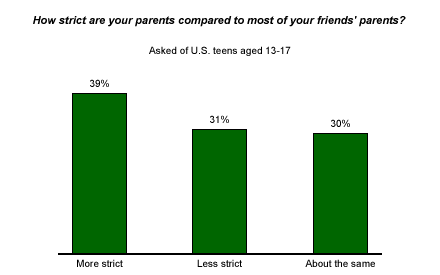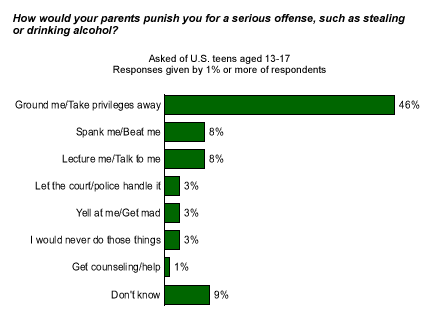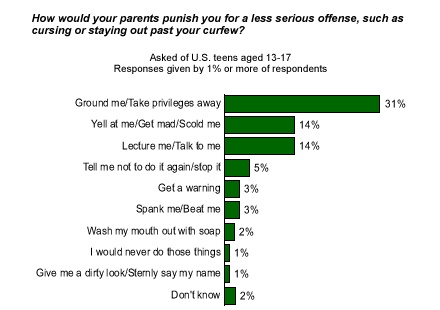The question of how to discipline children vexes every parent at some point. To spank or not to spank? To ground or not to ground? How much, how little, and to what degree? Although children typically don't have much say in the way their parents discipline them, it is interesting to get their take on the issue.
From curfews to limits on phone, Internet, and car use, teens often rail against the "unfairness" of their parents' rules. Parents may be familiar with the complaint from teens that other parents let their children do whatever it is that they won't allow. Â鶹´«Ã½AV recently asked American teenagers to compare how strict their parents are with how strict their friends' parents are*. Thirty-nine percent of teens believe that their parents are stricter than most of their friends' parents. Almost a third (31%) say their parents are less strict than their friends' parents, and 30% say their own parents and their friends' parents are about the same.

How Are Teens Punished?
Â鶹´«Ã½AV also asked teens specifically how their parents would punish them for a serious offense, such as drinking alcohol or stealing, and for a less serious offense, such as cursing or breaking their curfew. In both cases, the largest percentages of teens say they would be grounded or have privileges taken away.
Nearly half of teens (46%) say their parents would ground them or take away some kind of privilege if they committed a serious offense. Eight percent of teens say their parents would lecture or talk to them, and another 8% say their parents would spank them. Other punishments that teens say their parents might use include letting the police/courts handle the situation, yelling, or sending the teen to counseling. Three percent of teens say they would never do things like stealing or drinking.

Interestingly, teens' responses to this question do not necessarily differ depending on whether they think their parents are more or less strict than their friends' parents. When asked how she would be punished for a serious offense, a 15-year-old girl who feels that her parents are more strict than other parents says, "They would probably make me stay in my room for a long time and I would be forbidden from going to parties, watching television, and using the phone or computer." A 13-year-old boy who identified his parents as less strict than other parents would meet a similar fate: "Grounded for four months and no parties or going over to friends' houses, and no car until I'm like 18."
In the case of less serious offenses, a significant percentage of teens -- 31% -- also report that they would be grounded or have privileges taken away, although many say that it would be for a lesser amount of time than for a serious offense. Teens also say they would get yelled at (14%), lectured (14%), or told not to do it again (5%). A small percentage of teens (2%) say their parents would use an old-fashioned punishment -- washing their mouths out with soap -- for cursing. A 17-year-old girl says she would have to "suck on a bar of soap for about 30 minutes" if she were caught cursing.
Other teens are confident that they can commit minor offenses and avoid punishment altogether. As one 14-year-old boy says, "I can get away with that most of the time with no problem."

A 16-year-old boy who thinks his parents are more strict than other kids' parents takes a cynical view of the way his parents punish him for minor offenses: "They yell at me for excessive amounts of time, usually until they forget what it is they are yelling at me about." One of the more creative punishments for a minor offense, cited by a 14-year-old boy, is striking in its simplicity: "push-ups."
*The Â鶹´«Ã½AV Youth Survey is conducted via an Internet methodology provided by Knowledge Networks, using an online research panel that is designed to be representative of the entire U.S. population. The current questionnaire was completed by 439 respondents, aged 13 to 17, Aug. 8-19, 2004. For results based on the total sample, one can say with 95% confidence that the maximum margin of sampling error is ±5 percentage points.